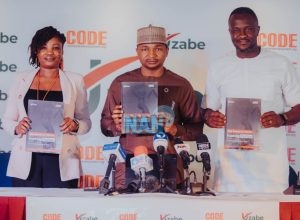
Mr Hamzat Lawal ,Chief Executive CODE (2nd left) with other during the unveiling of the report in Abuja
By Angela Atabo
A civil society organisation, Connected Development (CODE) has unveiled a pre-election security assessment report and electoral intelligence technology to monitor the 2023 elections.
Mr Hamzat Lawal ,Chief Executive CODE , at the official launch in Abuja said the report has tagged Same Currency for Violence; Troubling Elections and the EI electoral monitoring tool were initiatives under its Uzabe platform.
According to Lawal, using the Uzabe platform, CODE actively participated in election observation in Nigerias 2015 and 2019 General Elections and deployed over 10,000 observers in both polls.
He said that for the 2023 elections, leveraging the Uzabe platform, CODE would deploy 20,000 community-based observers to provide real-time situation reports from their polling units using two of its channels to provide structured and unstructured data.
CODE is not interested in the result of the elections but interested in the processes of the elections to ensure that INECs guidelines are adequately met in this election.
The high rate of insecurity as well as the cash crunch due to the Central Banks currency redesign policy has escalated the tension causing growing fears, and might impact voter turnout, and as well cause voter apathy among Nigerians.
We know that corrupt politicians were planning to leverage on this situation to further induce voters, and we are scared that Nigerians may have no option than to sell their votes on election day because of the impact of access to naira.
One area we are also concerned about is the fact that INEC, looking at the Nigerian Electoral Act 2022 as amended, has the powers to postpone this election on the possibility of breach of peace and security.
Lawal said that CODE was also partnering with Meta to help bring down fake news on social media that might make round on the day of the election.
He said that CODE would collaborate with security agencies and critical stakeholders who would use the platform to have security insights to improve security situations.
There will be an upcoming situation room by CODE on Friday Feb. 24 which will involve other CSOs.
Also speaking, Mr Emmanuel Njoku , Director of Democracy and Governance, CODE , called for the need to extend Nigerias voting time from six hours upwards.
Njoku said that Kenya deployed technology similar to the Bimodal Voter Accreditation System (BVAS ) for its recently concluded 2022 Elections.
He said that Kenyas voting population of about 22 million had about 11-12 hours to cast their ballot.
Still, Nigeria with a larger population of registered voters allocated only six hours for voters to carry out their civic responsibility.
Meanwhile , CODE also held a roundtable between media and Civil Society Organisations to drive collaborations on effective coverage and reporting of the 2023 elections.
The roundtable was on how CSOs and media practitioners could uphold the integrity of the electoral process and the forthcoming elections.
Present at the event were Directors and representatives from various CSOs like the International Centre for investigative reporting (ICIR), Civil Society Legislative Advocacy Centre (CISLAC),and Centre for Democracy and Development (CDD).
Others were : SERAP, Accountability Lab, Radio Now, Citizen FM, Ready to Lead Africa, and other reputable media and Civil Society Organisations.
A memorandum of understanding(MOU) was signed between CODE and media organisations to facilitate collaborative efforts toward tackling fake news, misinformation, and disinformation that have the potential to significantly impact the 2023 elections. (NAN)(nannews.ng)
Edited by Abdulfatai Beki/SadiyaHamza
Source: NAN News